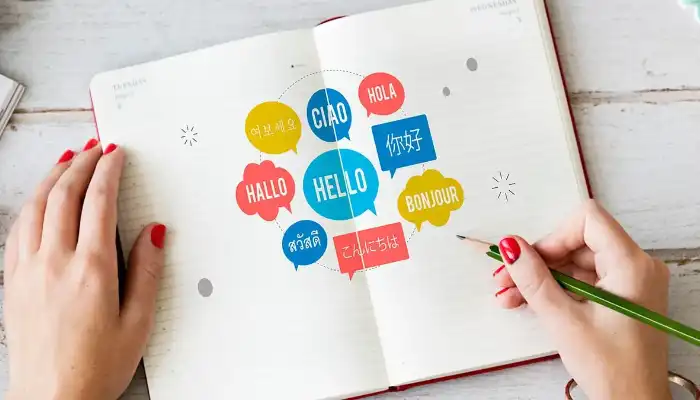Language is the foundation of connections between individuals. It is an unseen bond that both links up nations and sets minds on fire—a bridge that enables the exchange of personal and epic narratives. However, the enchantment of language encompasses more than just communication. Mastering new languages comes with lots of benefits that impact all aspects of our lives and transform us cognitively, personally, and professionally.

Cognitive Boost: Sharpen Your Mind
Our brain is like an intricate muscle that thrives on facing challenges. Learning a foreign language presents you with cognitive processes with delightful complexity, ensuring your mind never gets idle. Cognitive benefits for multilingual people include:
- Better Memory and Cognitive Functioning: Dealing with fresh vocabulary, grammatical rules, and sentence patterns in another language develops memory tracks at large while boosting overall cognitive ability. Just imagine how much easier it would be to recall names, directions, or even shopping lists!
- Sharpened Problem-Solving Skills: When confronting unfamiliar grammar or sentence structures in another language, your brain has to change its approach to problem-solving. Decoding unfamiliar grammatical structures and sentence patterns builds critical thinking skills and enhances creative thinking abilities to solve problems.
- Expanded Creativity & Mental Flexibility: Language acquisition goes far beyond memorizing facts by rote; it involves grasping the complexity inherent in words themselves. The more involved one becomes with any new language, the more they begin discovering different ways of thinking that make them understand better about their own self-expression because their intellects are flexible enough.
Personal Growth: Building Confidence And Embracing The World
Learning a foreign language entails much more than simply learning new words; it opens up entire universes unimaginable before! Personal growth through language acquisition is truly amazing! Here are some examples:
- Boosted Confidence and Self-Esteem: Speaking fluently in another tongue means success—an achievement worth being proud of. Climbing over initial hurdles to fluency builds confidence and satisfaction in many other spheres of life.
- Understanding and Empathy: Learning a new language lets you glimpse into the heart of a culture. Every language is suffused with its own peculiarities, customs, traditions, and values; such insight into people speaking it and their lifestyles can be very profound. Consequently, when you are immersed in another language, not only will you gain more knowledge about cultural differences but also develop some empathy for individuals from that community. This self-developed awareness enables us to appreciate others’ experiences, thus building bridges among global societies (worldviews).
- Expanding One’s Horizons And Appreciation For Diversity: Entering the world of another language feels like embarking on a journey into unknown realms. It creates room for interaction with various kinds of people, which contributes immensely in enriching your knowledge regarding humanity’s different cultural outlooks. With fluency in this second dialect, one gains an expansive horizon upon which he/she can appreciate differences among all peoples.
The Career Advantage: Unlocking Opportunities
Multilingualism plays an important role in the world as it grows smaller as the global economy takes shape today. Here is how learning another language can offer you an advantage over your competitors:
- More Job Opportunities, More Attractive On The Market: Fluency in another language increases one’s hiring prospects by a great margin of certainty. That is because it shows how adaptable you are and that you can communicate effectively, as well as being willing to learn what potential employers always look for in candidates.
- Ability To Work In A Multi-Cultural Environment: With the growing internationalization of business, effective interaction with foreign colleagues or clients becomes more important; hence, language skills open doors to exciting careers in the globally connected market.
- Competitive Edge in Globalized Industries: A second language is almost a necessity in areas like international trade, tourism, or diplomacy. In these competitive industries, linguistic competence gives you a considerable advantage that may make a difference when it comes to promotions and leadership.
Beyond Communication: The Advantages of Multilingualism
To be able to converse in another language is not only useful but also important for personal growth. Here are some richly rewarding glimpses into the lives of those who choose to learn languages:
Social Benefits:
- Strengthened interpersonal relationships: Imagine creating stronger connections with friends, family, or colleagues from different cultures. Speaking their language shows your interest in their culture and facilitates deeper communication.
- Facilitated travel and cultural immersion: Imagine being able to navigate through a foreign city easily, knowing local customs, and being part of this cultural tapestry. Language competence makes traveling more real.
- Connection to broader communities and networks: The world is becoming more intertwined. With knowledge of another language, people can establish relationships with diverse groups across borders through friendship and work purposes.
Health Benefits:
- Delayed onset of dementia and cognitive decline: Research has suggested that bilingualism might have some protective effect on cognitive function by helping brain functions stay younger for longer periods, thereby preventing age-related cognitive decline.
- Reduced stress and improved mental well-being: Not being able to communicate properly when living in a foreign country can be quite distressing. On the other hand, fluency allows one to handle new things confidently, thus reducing anxiety levels as well as stress.
- Enhanced brain health and neural plasticity: Your brain becomes active as well as flexible when juggling between languages. This activity helps improve general brain health while also promoting neural plasticity, which is the brain’s ability to learn new things quickly.
Equipping Yourself for Success: Practical Language Learning Tips
Although learning another language may seem intimidating at first glance, it can be an immensely gratifying experience if undertaken correctly. Here are some practical tips that will help you on your journey to fluency:
- Set achievable goals and create a study plan: Do not start by overwhelming yourself with the goal of becoming fluent overnight. Begin with small, achievable goals and make for yourself a realistic timetable for study that matches your schedule. Consistency is paramount!
- Practice regularly through immersion, conversation, and media consumption: The more you can surround yourself with a language, the better. Listen to music in it, watch movies in it, and try to talk to native speakers at every opportunity.
- Utilize language learning resources and tools effectively: There are many online as well as offline language resources available these days. For instance, explore apps, take online classes, listen to podcasts, or buy textbooks that can best assist you in doing this.
Embracing the Journey: Overcoming Challenges
It’s not an overnight thing to learn a new language; it’s a journey that requires time and dedication. You will face difficulties along the way, but with the right mindset, you can overcome them.
- Patience and Perseverance in the Face of Difficulties: Remember that learning another language is a process. We all make mistakes, which can be lessons in disguise. Therefore, do not be disheartened by these setbacks; instead, focus on how far you have come and keep moving.
- Embracing Mistakes as Part of the Learning Process: Every skill requires mistakes to be committed before it is perfected, including second language acquisition. Do not be scared to make errors since this works towards your improvement. Even if you find it hard to express yourself, continue practicing without caring whether you are wrong or right because practice makes perfect, hence becoming more confident when speaking English.
- Seeking support from peers, tutors, or online communities: Make sure that there is always someone who will support you whenever necessary. Find other people who learn languages like yours so you can share experiences; hire a one-on-one teacher; or join a virtual classroom where students communicate in different languages via Skype, etc. Growing up alongside someone else makes both of you motivated because he/she understands what challenges lie ahead of each other.
Conclusion
It is a personal investment, and it opens up a lot of opportunities; hence, learning new languages should be treated as such. In return, one gets to build stronger connections with people around them and stays open-minded too. Interestingly, this helps to keep the brain working properly.
Start your way towards being transformed today by taking the first step towards learning! Embrace challenges, acknowledge achievements, and become a part of global interaction. There are countless benefits for that.
